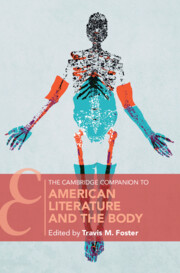Book contents
- The Cambridge Companion to American Literature and the Body
- The Cambridge Companion to American Literature and the Body
- Copyright page
- Contents
- Contributors
- Chronology of Publications and Events
- Acknowledgments
- Introduction
- Part I Genres
- Part II Critical Methodologies
- 9 Feminist Theory, Feminist Criticism, and the Sex/Gender Distinction
- 10 Reading Bodies and Textual Materialities
- 11 How to Read Disabled Bodies in History
- 12 How to Read Disabled Bodies Now
- 13 Health Humanities, Illness, and the Body in American Literature
- 14 The Indigenous Body in American Literature
- 15 The Black Body and the Reading of Race
- 16 Ecocriticism and the Body
- Further Reading
- Index
- Cambridge Companions To …
9 - Feminist Theory, Feminist Criticism, and the Sex/Gender Distinction
from Part II - Critical Methodologies
Published online by Cambridge University Press: 30 July 2022
- The Cambridge Companion to American Literature and the Body
- The Cambridge Companion to American Literature and the Body
- Copyright page
- Contents
- Contributors
- Chronology of Publications and Events
- Acknowledgments
- Introduction
- Part I Genres
- Part II Critical Methodologies
- 9 Feminist Theory, Feminist Criticism, and the Sex/Gender Distinction
- 10 Reading Bodies and Textual Materialities
- 11 How to Read Disabled Bodies in History
- 12 How to Read Disabled Bodies Now
- 13 Health Humanities, Illness, and the Body in American Literature
- 14 The Indigenous Body in American Literature
- 15 The Black Body and the Reading of Race
- 16 Ecocriticism and the Body
- Further Reading
- Index
- Cambridge Companions To …
Summary
“In literature I sensed the possibility of the integration of feeling/knowledge, rather than the split between the abstract and the emotional in which Western philosophy inevitably indulged,” writes Barbara Christian in her foundational discussion about Black feminist literary theory.1 While she critiques the veneration of theoretical abstraction, Christian, too, pushes against the biologically reductive, eurocentric preoccupation of white French feminist theorists who fixate on “the female body as the means to creating a female language.”2 Wary of producing a monolithic feminist literary theory herself, she draws our attention to the intertwined problems that emerge when we ask whose bodies, writings, theories, labors, experiences are centered. As Christian’s essay illustrates, feminist theory provides multitudinous convergent and divergent ways to understand bodies and their relations to and through the world via what has been variously termed “gender” and “sex.” To only define feminist theory as by women and for women ignores traditions from manifold configurations of histories, cultures, and politics that place different weight on the term “women” as they seek to comprehend, to critique, to survive, and to reimagine the world.
- Type
- Chapter
- Information
- The Cambridge Companion to American Literature and the Body , pp. 135 - 149Publisher: Cambridge University PressPrint publication year: 2022



